Design Stages for a Booking Website:
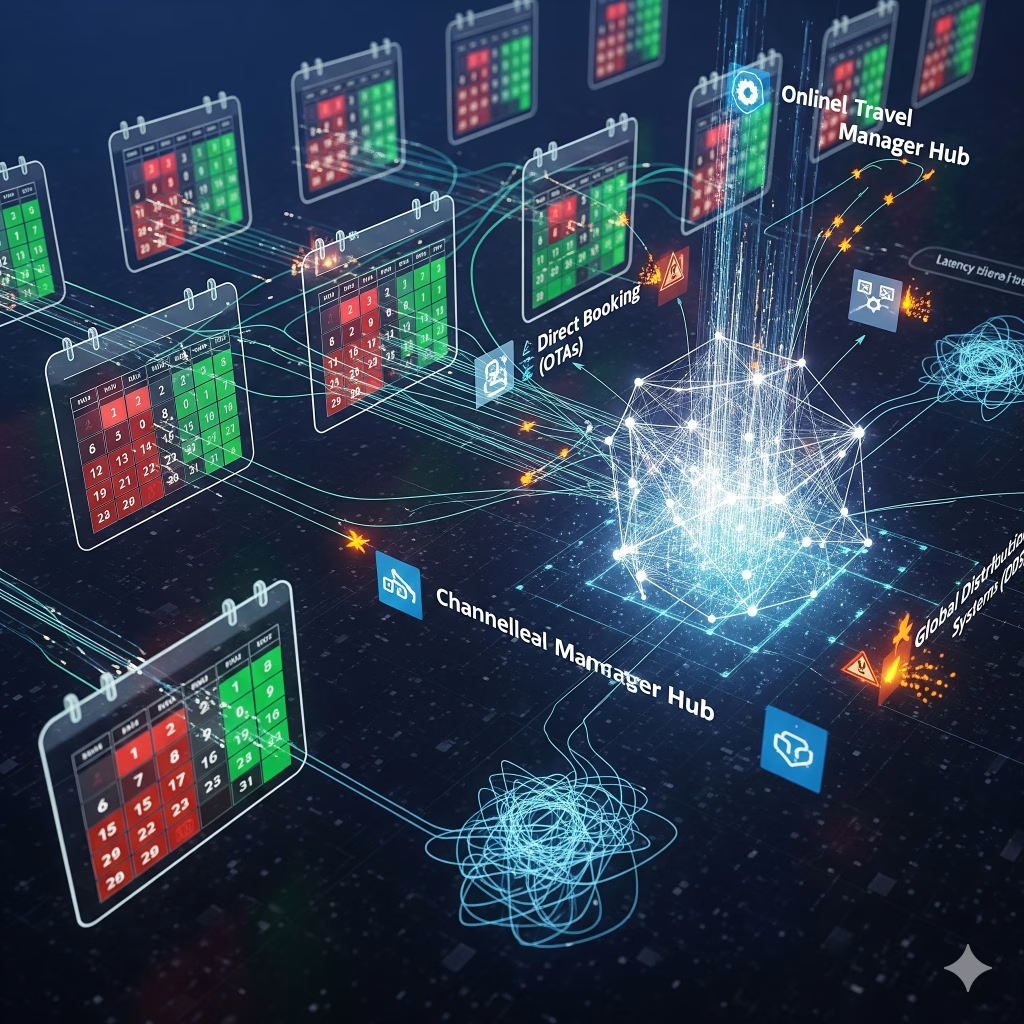
Designing a booking website requires a structured approach where each stage builds upon the previous one. This ensures the final platform is functional, user friendly, scalable and optimized for conversions. Below is a clear outline of the major stages involved in creating a professional booking and rental system.
-
Research and Discovery
Begin by identifying the business goals, user personas and market competitors. Collect insights on the type of services or rentals being offered, pricing models and customer expectations. This stage creates the foundation for both design and development decisions.
Objective: establish product market fit requirements constraints and success metrics before design work begins. Core activities include stakeholder interviews analytics review market research competitor benchmarking user interviews and technical audit. Deliverables are a product brief prioritized use cases user personas journey maps and a risk register. Required inputs include analytics access content inventory and regulatory constraints. Acceptance criteria: product brief approved by the product owner research questions resolved and a prioritized list of features ready for design.
- Artifacts: product brief personas prioritized features research highlights
- Stakeholders: product owner marketing legal operations
- Recommended tools: Figma for artifacts Miro for workshops Google Analytics for behavior data
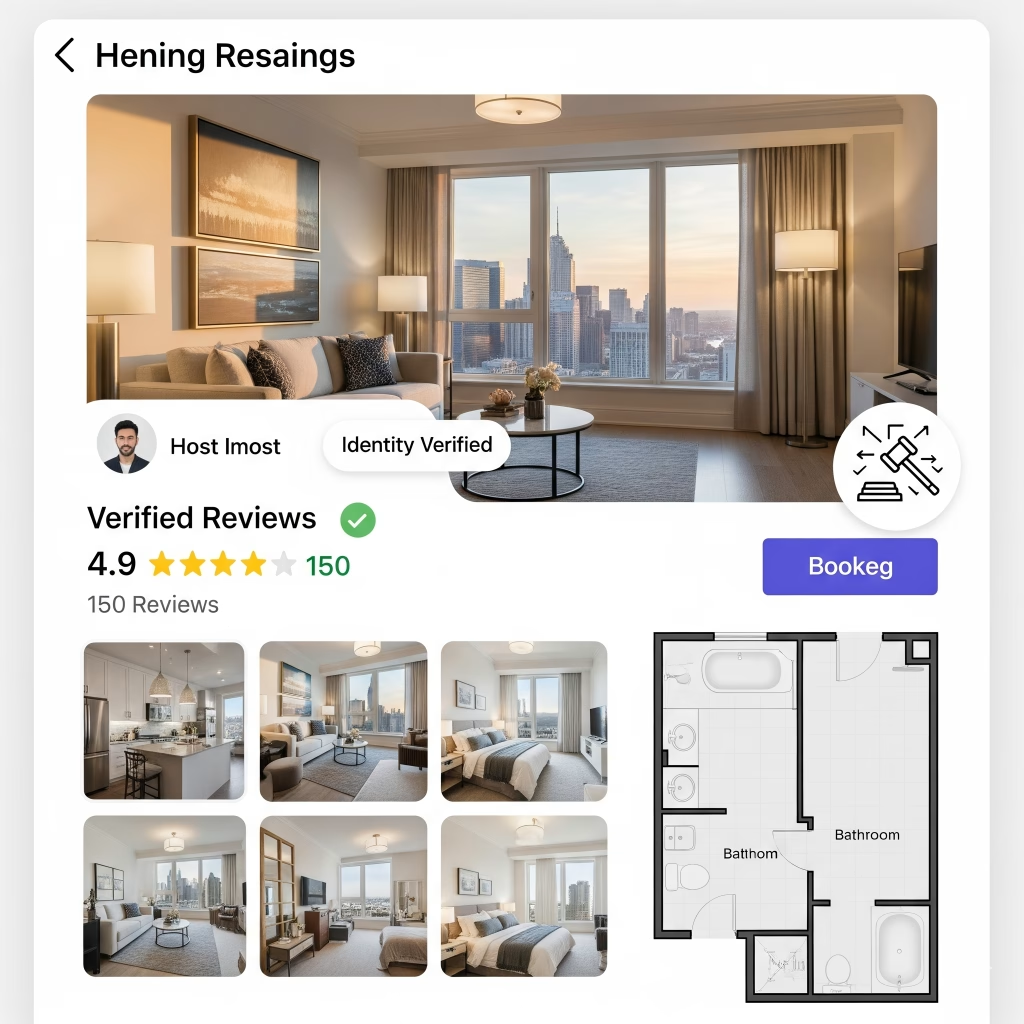
-
Information Architecture and Wireframing
Map out the content structure and booking flows. Create wireframes that outline page layouts, navigation menus, search filters and booking steps. This helps visualize how users will interact with the platform before any visual design is applied.
Objective: convert research into a product strategy that drives design decisions. Activities include defining booking flows business rules pricing and cancellation policies service level objectives and KPI definitions. Create a feature map that separates must have features nice to have features and future enhancements. Deliverables include user stories acceptance criteria a prioritized roadmap and a minimal viable product scope that captures the smallest feature set needed to validate demand. Acceptance criteria: roadmap approved stakeholders aligned on MVP scope and measurable KPIs defined for launch.
- Artifacts: user stories acceptance criteria business rules roadmap
- Stakeholders: product owner finance operations growth
- Outputs: KPI definitions for conversion retention average booking value
-
UI and UX Design
Develop high fidelity designs that define the look and feel of the site. Focus on clarity, intuitive navigation and mobile responsiveness. Include elements such as calendars, availability indicators and booking forms, making sure they are simple to use.
Objective: define the navigation structure content hierarchy search behavior and interaction patterns that make booking reliable. Activities include card sorting content inventory taxonomy design and sketching flows for search results listing pages booking widget checkout and host dashboards. Deliverables are site maps content models wireframe sketches and a specification for search and filtering that captures availability rules filters and sorting priorities. Acceptance criteria: sitemap validated with stakeholders wireframes tested with users and search specification approved for handoff.
- Artifacts: sitemap content model wireframes search and filter specification
- Stakeholders: UX lead content dev lead
- Focus: accuracy of dates availability and predictable search relevance
-
Booking Engine Integration
Implement or connect a booking engine capable of handling reservations, availability management and secure payments. This stage involves selecting the right plugins or custom solutions that align with business needs.
-
Payment Gateway and Security
Integrate secure payment gateways (Stripe, PayPal or bank solutions) with SSL certificates and fraud prevention measures. Trust is essential for users to complete bookings confidently.
-
Testing and Quality Assurance
Run usability tests across devices and browsers. Validate that bookings flow correctly, payments process without error and availability calendars sync properly. Identify and fix bugs before launch.
- Launch and Optimization
Deploy the website and monitor analytics to track conversions, abandonment rates and load performance. Collect user feedback and iterate on improvements. Ongoing optimization ensures long term growth and reliability.
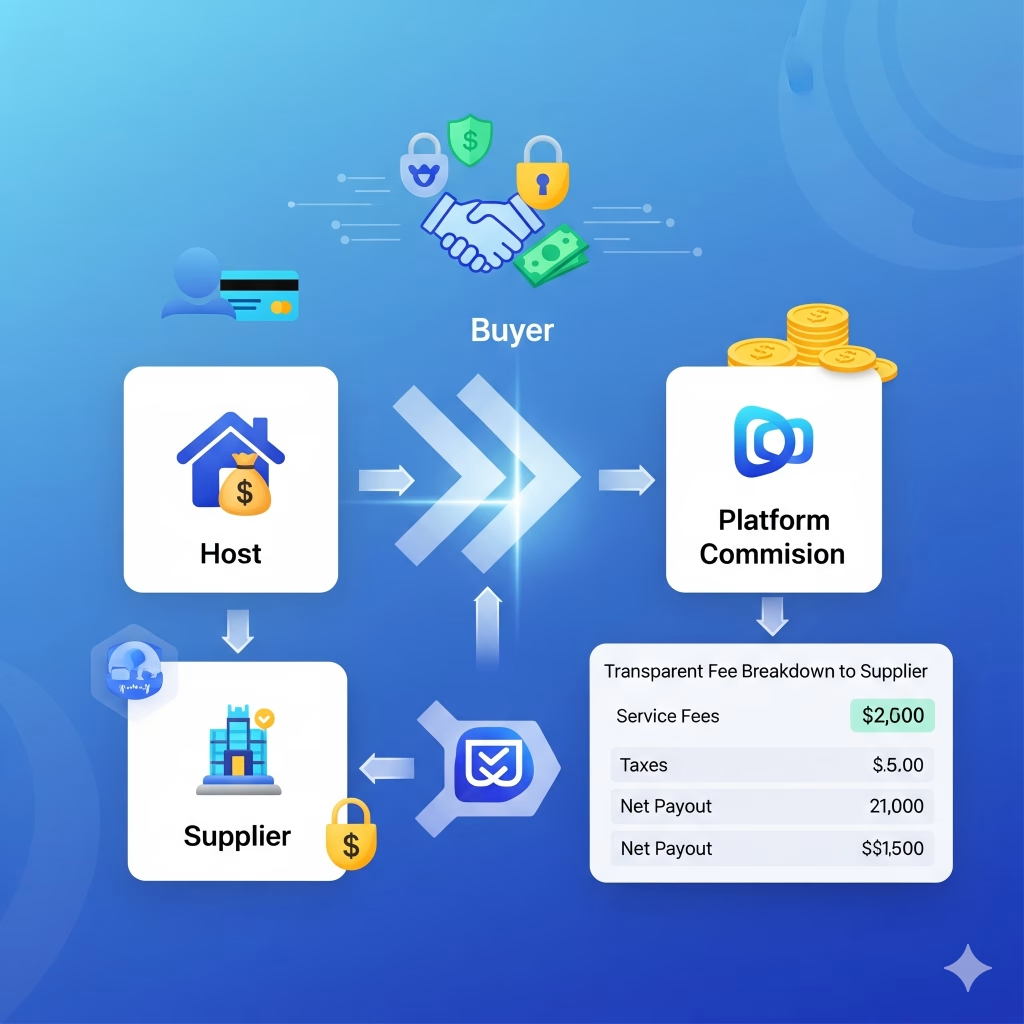
Design stages required to deliver a production ready booking website. Each stage includes objectives core activities deliverables stakeholders and clear acceptance criteria. Use the outline to sequence work assign ownership and create checkpoints that prevent rework.
Discovery and research
Strategy and product definition
Information architecture and UX strategy
Interaction design and wireframing
Design prototypes that validate interactions before visual polish. Activities include mapping calendar selection availability blocks booking confirmation flows and error states such as conflicts and payment declines. Produce clickable prototypes for desktop and mobile that demonstrate booking behavior under edge cases. Deliverables include annotated wireframes prototype flows error states and an interaction specification for developers. Acceptance criteria: prototype validated in usability tests edge cases handled correctly and interaction specification reviewed by engineering.
- Artifacts: annotated wireframes prototypes interaction specification
- Stakeholders: interaction designer QA lead dev lead
- Testing: usability sessions that include real availability conflicts
Checklist for governance: assign a product owner define acceptance criteria before each stage starts require sign off at gates maintain a central repository of artifacts and schedule recurring reviews for integrations and compliance.
External resources:
- RFC 5545 iCalendar standard
- Stripe Connect platform payments
- SiteMinder channel manager
- Cloudbeds channel manager
- schema.org LodgingBusiness
- Google hotel price structured data
- Core Web Vitals guidance
- WooCommerce Bookings documentation
- Bookly documentation
- Amelia booking plugin documentation
- EU data protection overview
Booking and rental web design is the deliberate craft of turning time based access to assets into predictable revenue and reliable user experiences. The subject covers digital flows that let people discover, evaluate, reserve, pay for, occupy and review access to resources such as vacation properties, car hire, equipment rental, event spaces, tours, lesson slots and professional appointments. A booking site is the junction of calendar logic, availability constraints, price engines, identity verification, payment rails, trust signals and operations tooling. Design in this space is not merely visual styling; it is the engineering of a lifecycle that begins the moment a prospect searches and ends only when the platform closes the loop on the transaction and captures the data needed to improve retention. For business owners this means thinking of the site as product and operations in one package rather than as a brochure with a checkout button. Wemaxa pages that describe our services and integration options are linked for quick reference Wemaxa services, E commerce and AI integration in e commerce.
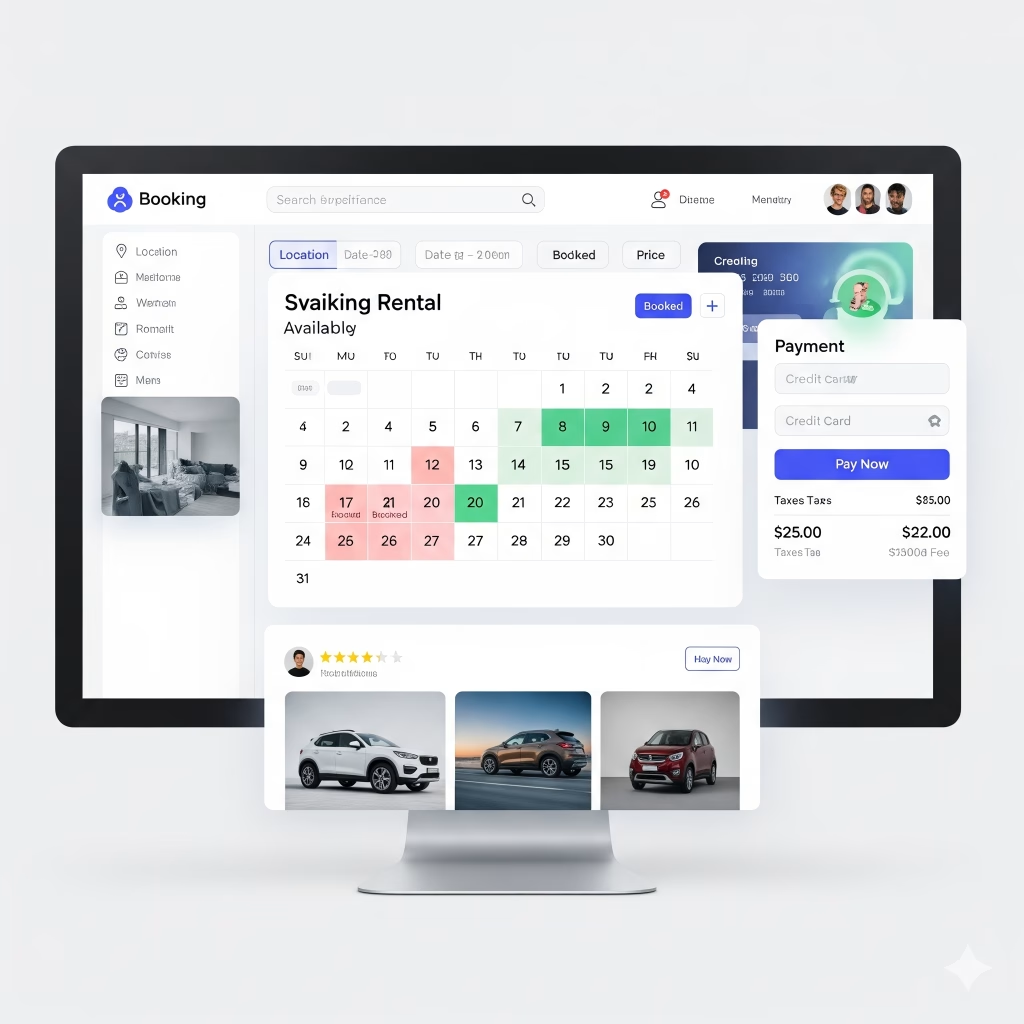
Different booking and rental business models demand different design trade offs. Reservation models where inventory is owned by the platform require inventory management and logistics workflows. Marketplace models where third party hosts or suppliers supply inventory require vendor onboarding, payout orchestration, dispute handling and reputation systems. Hybrid models combine both approaches so design must support flexible permissions and multi sided dashboards. Pricing models vary from fixed hourly or nightly rates to dynamic price lists that respond to demand, lead time and competing channels. Some businesses capture deposits only some take full payment up front some allow pay later options. Cancellation policies and fee schedules influence conversion so interface copy must make policies clear at the moment of commitment. Design choices about how and when to surface fees and service charges directly affect conversion metrics and vendor retention so these are product decisions with measurable economic outcomes rather than cosmetic choices.
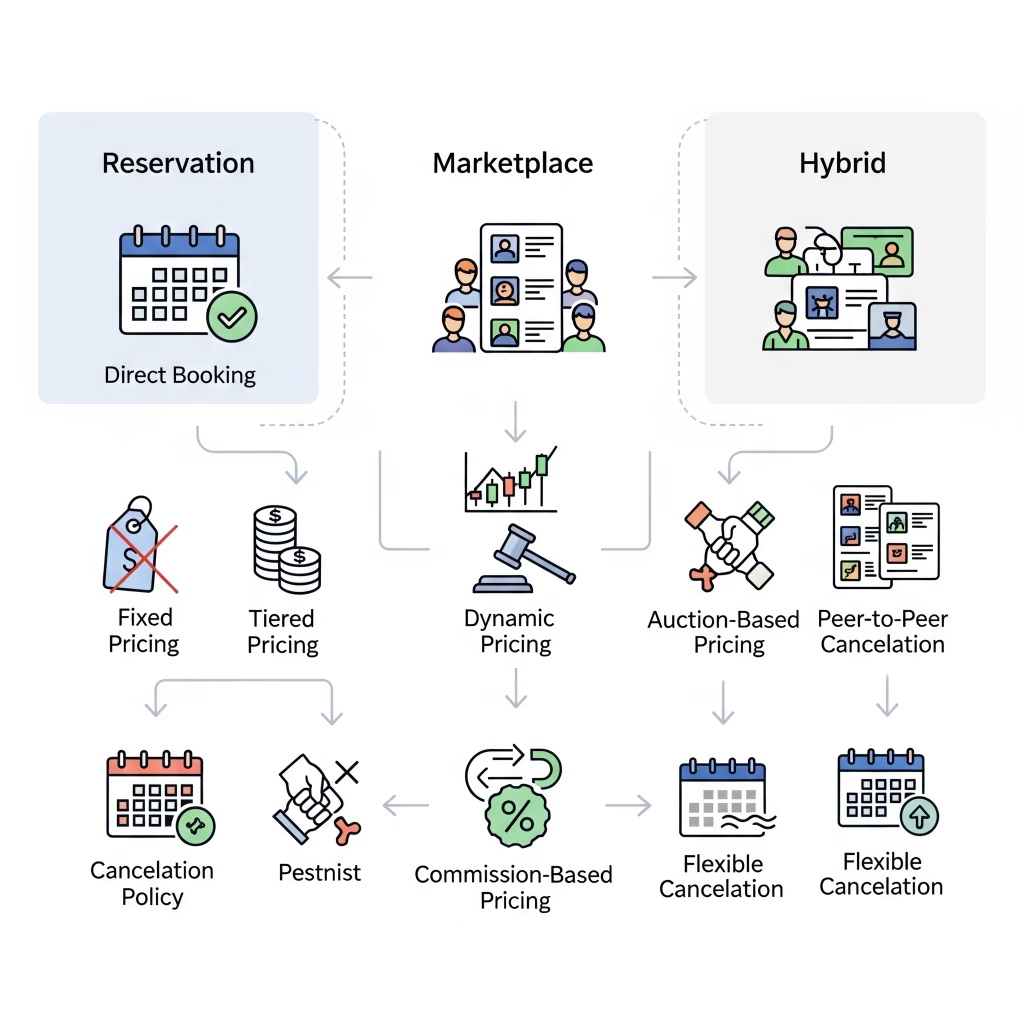
Calendars and availability are the core technical challenge of any booking platform. Subtracting a booked date from availability must be atomic and observable across all channels where the inventory is sold to prevent costly overbookings. Standardizing calendar data and offering import export sync via iCal is fundamental because many external systems and listing sites support iCalendar. Implementing robust two way calendar sync and providing conflict resolution flows requires following the iCalendar standard and best practices for recurrence and free busy queries. For businesses listing inventory on multiple distribution channels using a channel manager is the pragmatic way to maintain consistency across OTAs and your direct booking site because those systems update availability and rates in real time to avoid double bookings and revenue leakage. Examples of channel manager vendors and their documentation show how listings are synchronized and why integration matters for growth and reliability.

Payments and payout orchestration shape legal exposure and user trust so design must bake payment decisions into the product narrative. Use payment providers that support platform flows such as connected accounts split payouts escrow like Stripe Connect when you need to move money between buyers, hosts and your platform while enforcing refunds and fees programmatically. Deposits, authorizations, pre authorizations at check in, partial refunds and chargebacks all require UX that educates the user without sacrificing speed. PCI compliance and card tokenization are mandatory considerations so integrating with a modern provider that abstracts compliance reduces risk and engineering cost. Design the checkout to show the exact net payout to a supplier after fees so hosts can make real time decisions about promotions and availability.
Search, filters and booking flows must reflect the mental models of your audience rather than the internal categories of your business. For vacation rentals filters such as dates number of guests property type and immediate price range are primary inputs. For equipment rental availability windows size options and required licences or certificates are primary. For vehicle rental location pickup and drop off times fuel policy and insurance options matter. The booking widget must return reliable availability in milliseconds and surface ancillary options such as extras insurance and cleaning fees inline with price transparency. Progressive disclosure reduces cognitive load so present the essentials first price availability and cancellation policy then reveal secondary fields such as extras special requests or payment schedule. Mobile first designs need large touch targets lightweight forms and condensed flows that allow booking in a few taps while preserving trust signals and payment accuracy.

Visual content and trust mechanics determine whether a listing converts. Listings with poor photos get lower conversion even if they are cheaper. Encourage hosts to provide a set of primary images a floor plan and a minimum of one wide angle hero shot. When applicable provide tools for virtual tours 360 photography or video walkthroughs because those assets reduce uncertainty and support longer bookings. Reviews verified stays identity verification badges and response metrics must appear at the point of decision in the product detail template to reduce friction. Implement a dispute workflow that captures evidence timestamps and message threads so moderators can resolve issues with minimal manual effort. Design notifications and reminders so guests check in on time hosts prepare units and cancellations occur under transparent rules.
- Essential integrations to plan for at launch: calendar sync and iCal support for external calendars, a channel manager for multi channel distribution, a payment gateway with platform payouts, tax and VAT calculation service, map provider for geolocation and proximity search, email and SMS notification provider, analytics and event tracking for funnel measurement.
- Technical features to prioritise: atomic availability transactions search index tuned for dates and facets, server side rendering for SEO critical pages, image pipeline with WebP fallback for performance, webhooks for event driven automation, role based access for hosts and ops.
- Operational tooling: vendor onboarding checklist identity verification KYC where required, automated payout reconciliation, refund and dispute dashboard, automated reviews and reminders to capture repeat business.
SEO and structured data are required if you expect organic demand to be a primary acquisition channel. Use schema types relevant to booking and lodging such as LodgingBusiness accommodation and Offer to annotate core attributes like price currency availability and check in rules. For hotel oriented pages adopt Google recommended hotel price structured data so your rates and fees can be validated and surfaced accurately in hotel search experiences. Search engines prefer crawlable HTML with meaningful content so server side rendering or pre rendering of listing pages is critical for initial indexation. Performance also feeds SEO because Core Web Vitals are part of Google page experience evaluation so optimizing Largest Contentful Paint interactivity and layout stability improves both user experience and discoverability.
WordPress is a valid platform for many booking and rental projects when paired with the right plugins and architecture decisions. Out of the box WordPress plus WooCommerce and WooCommerce Bookings provides a rapid route to a functioning rental flow with material plugin support for calendars deposits and extras while commercially supported plugins such as Bookly and Amelia offer scheduling centric features and staff management that suit appointments and lessons. For inventory that must scale to tens of thousands of units or for marketplaces with heavy custom business logic consider a headless approach or a service oriented architecture where WordPress provides content and a dedicated booking service handles real time availability pricing and payouts. Many booking plugins expose REST APIs or webhooks which simplifies integration with external systems such as PMS and channel managers so plan your integration surface and test sync use cases early.
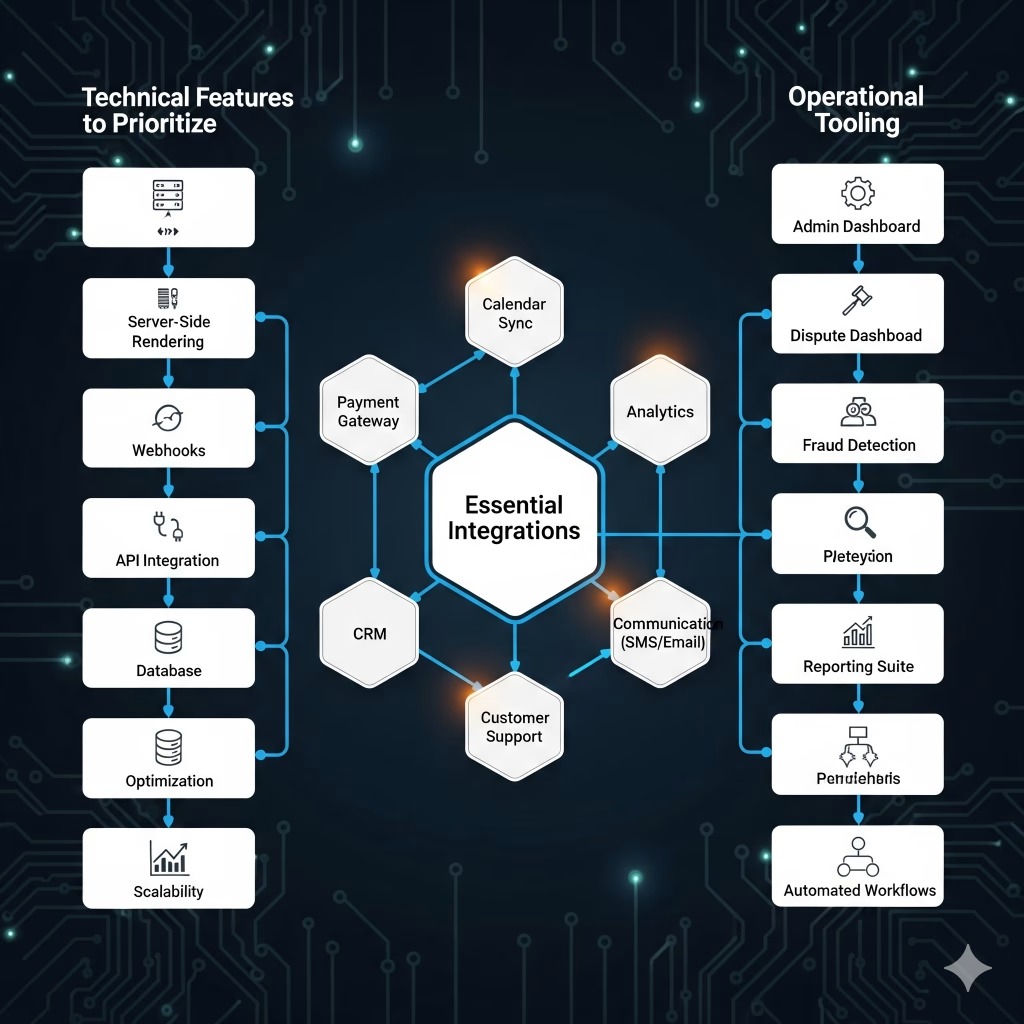
Legal compliance and security obligations are non negotiable and must be reflected in design. If you process personal data of EU residents ensure GDPR principles such as data minimisation purpose limitation and rights to access and erasure are implemented and documented. Rental businesses that handle identity documents must encrypt sensitive files at rest and in transit and enforce strict retention policies. Tax calculation and reporting differ by jurisdiction so integrate local tax engines or work with a payments partner that provides tax support. Fraud controls are essential for high value bookings so implement velocity checks device fingerprinting and anomaly detection to block automated attacks and card testing. Operationally prepare a compliance playbook that ties your UX wording to the legal policy so cancellations refunds and deposit disputes are traceable and defensible.
A final note on operations and growth: a booking platform is a long term operational product that requires continuous investment in content quality vendor relations and technical maintenance. Measure unit economics like customer acquisition cost lifetime value average booking value and host retention. Automate onboarding tasks for new hosts provide templated photography checklists and offer early guarantees or promotional support to secure initial supply. Use analytics to identify the funnels where users fail and prioritise fixes that move conversion metrics rather than cosmetic changes. For maintenance and ongoing technical operations Wemaxa provides services that cover updates monitoring backups and security which are critical to keeping bookings flowing without disruption. Building a successful booking or rental site is not a single project it is the assembly of product design technical architecture operations and legal clarity working together to convert interest into reliable bookings.


